Teen’s Service Dog Purchase From Dubious Source Falls Short, Now Plans To Abandon It
According to the Americans with Disabilities Act (ADA), a "service dog" is a dog that has received specialized training to carry out tasks or work for a person who is disabled. The dog's task or tasks must be directly related to the owner's impairment.
The dog should be trained to perform at least three distinct tasks. For a dog to be classified as a service dog, it must be fully trained.
Dogs in training must obtain authorization before entering a business or other public building, as they do not have the same rights as fully trained service dogs. Dog owners are allowed to train their dogs, as it is not mandatory to use a professional trainer.
One thing you should understand is that not every dog is suited to serve as a service animal. It requires years of commitment and the exact right disposition for the dog to take on that service role.
This simply means that your dog may or may not be a suitable fit. The OP of today's story got a red heeler puppy whom she was hoping to train to take over service dog work from her older dog.
The OP has tried in vain to train the puppy, but she doesn't feel that the pup actually enjoys working. The OP always has to struggle with the pup to get her to do what she's asking, so she decided to wash her instead.
The headline

The OP can't blame anyone but herself for the dog not living up to her dream
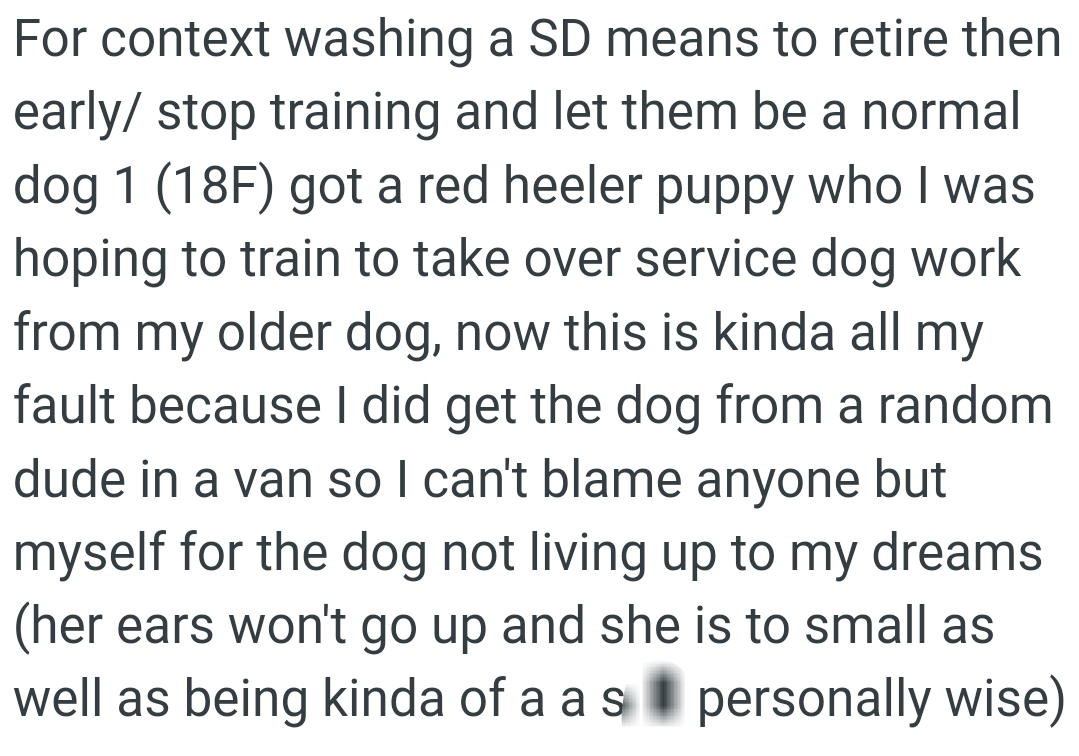
The Importance of Service Dogs
Service dogs play a critical role in providing support for individuals with disabilities, as highlighted by numerous studies in the field of animal-assisted therapy. Research shows that service dogs can greatly improve the emotional well-being of their handlers, reducing anxiety and increasing feelings of safety and independence. However, the decision to abandon a service dog can have significant emotional ramifications for both the owner and the animal.
Moreover, a strong bond between the handler and the service dog is crucial for effective assistance, and breaking that bond can lead to feelings of guilt and loss. It's essential for individuals to thoroughly assess their readiness and capability to handle the responsibilities that come with service dog ownership.
OP's mom thinks that she hasn't put enough effort into the pup's training
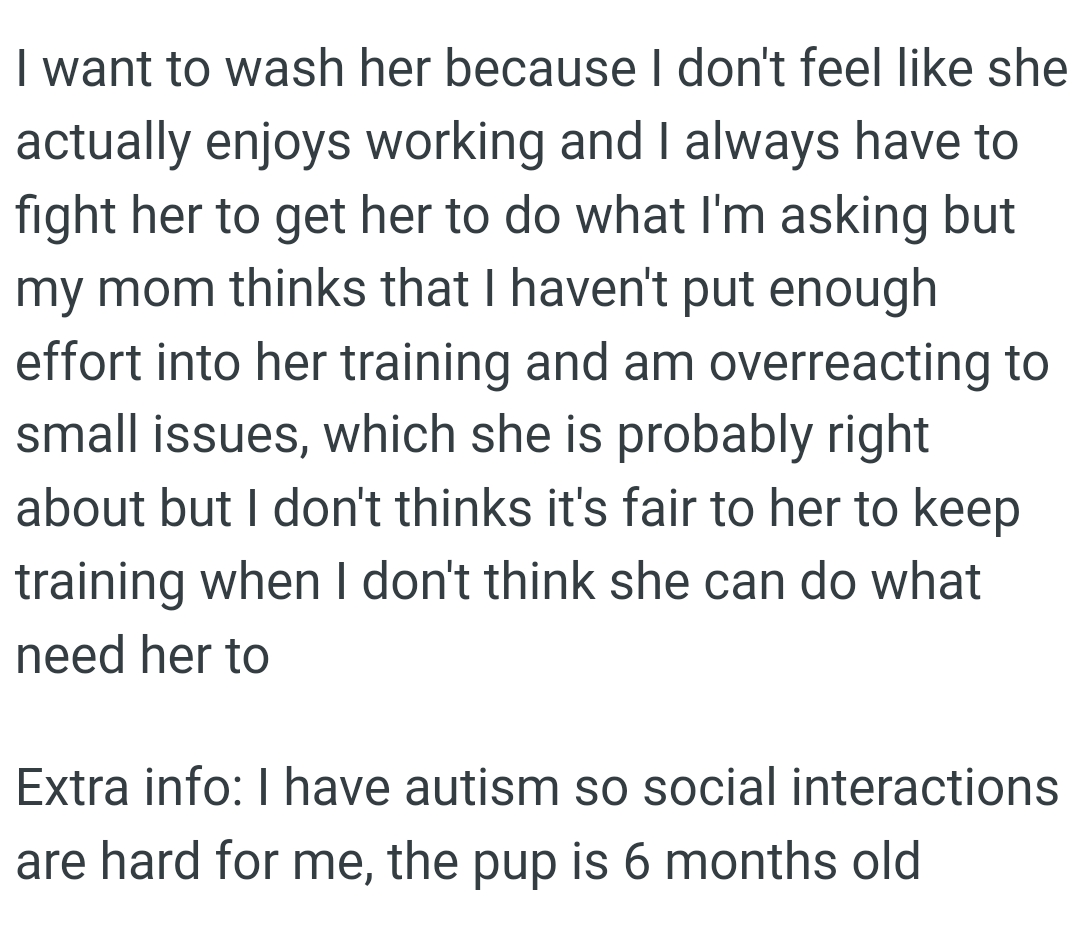
Let's head into the comments section and find out what other Redditors have to say regarding the story

Understanding Service Dog Expectations
The situation involving the service dog reflects important psychological principles regarding expectations and responsibility. According to Dr. Susan E. Dyer, a psychologist specializing in animal-assisted therapy, the emotional bond between humans and service animals is profound, often leading to expectations that the animal will fulfill specific roles in the person's life.
When those expectations are not met, disappointment can lead to frustration and anxiety, which may trigger abandonment fears and feelings of inadequacy in the owner. These emotional responses are not uncommon among individuals with disabilities who rely on their service animals for support.
It is entirely possible that the OP is right

She's not going to provide the kind of service the OP needs
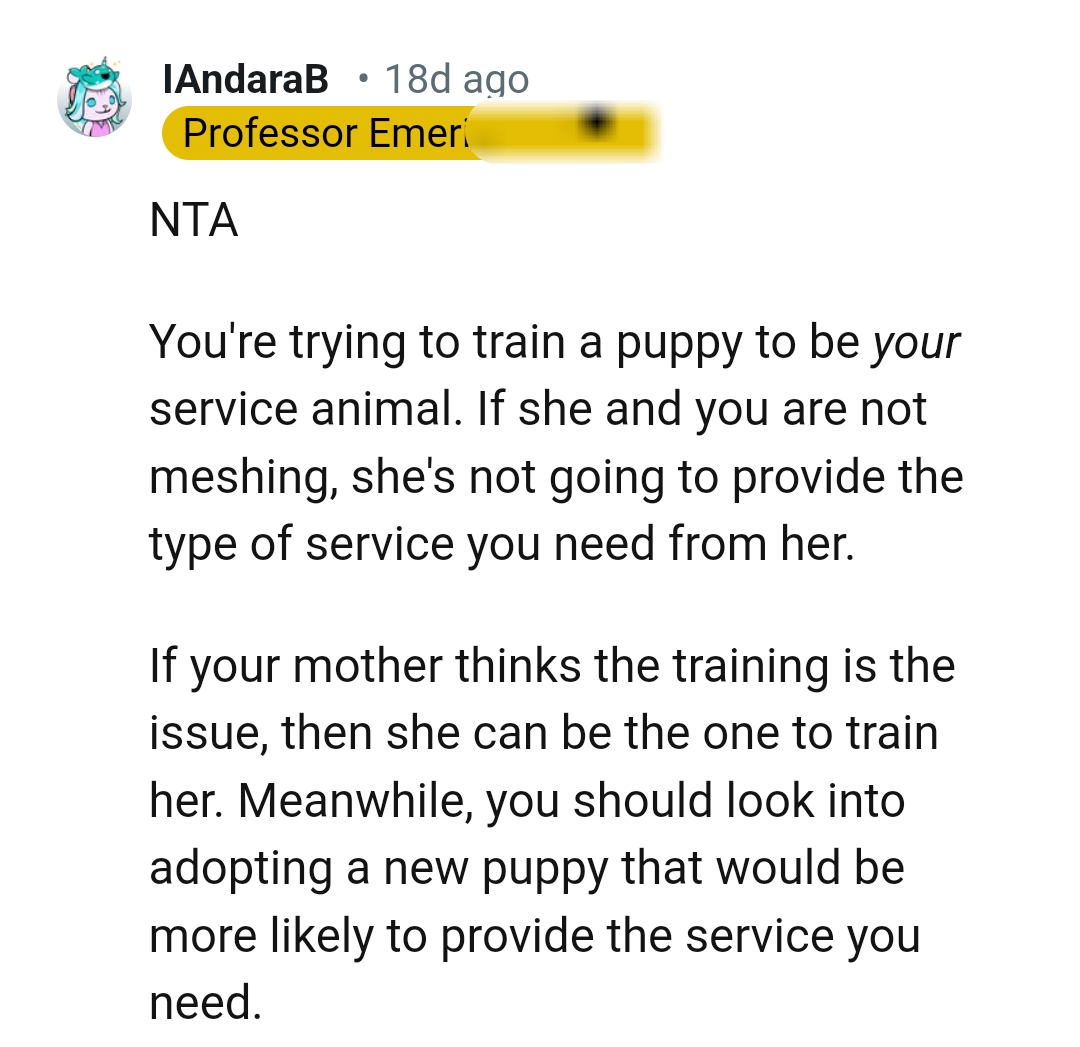
OP has offered the following explanation for why they think they might be the AH:
I might be the AH because I got into a fight with my mom over something stupid.
Part of what makes service dogs so good
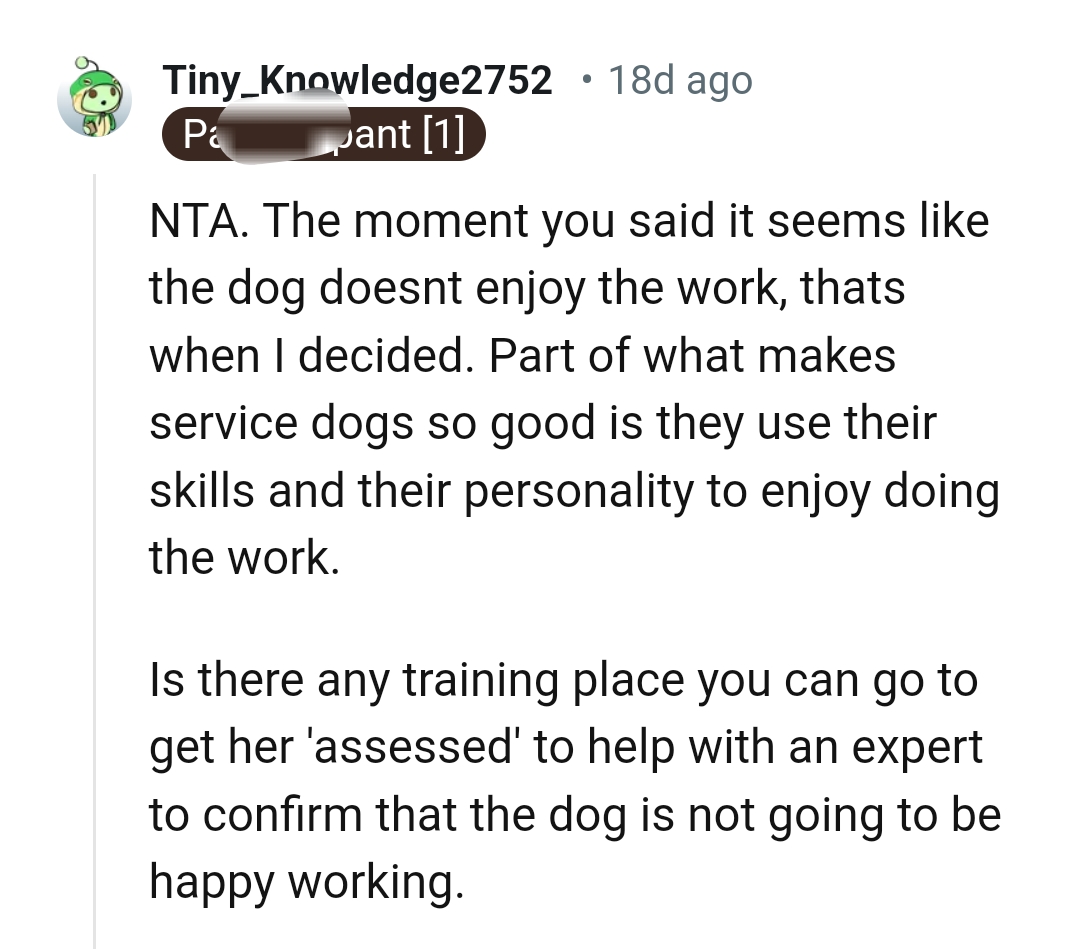
And the comments continue...

Experts in animal psychology emphasize that the decision to abandon a service dog often reflects deeper issues of stress or overwhelm in the owner's life. According to research from the Journal of Veterinary Behavior, individuals who feel unsupported or unprepared for the demands of training a service dog may experience a decline in mental health, which can exacerbate feelings of inadequacy or helplessness.
To address these feelings, potential handlers should consider seeking professional guidance before acquiring a service dog, ensuring they have the necessary support systems in place to manage the challenges of training and integration.
A good candidate for a service dog

The dog does still need training
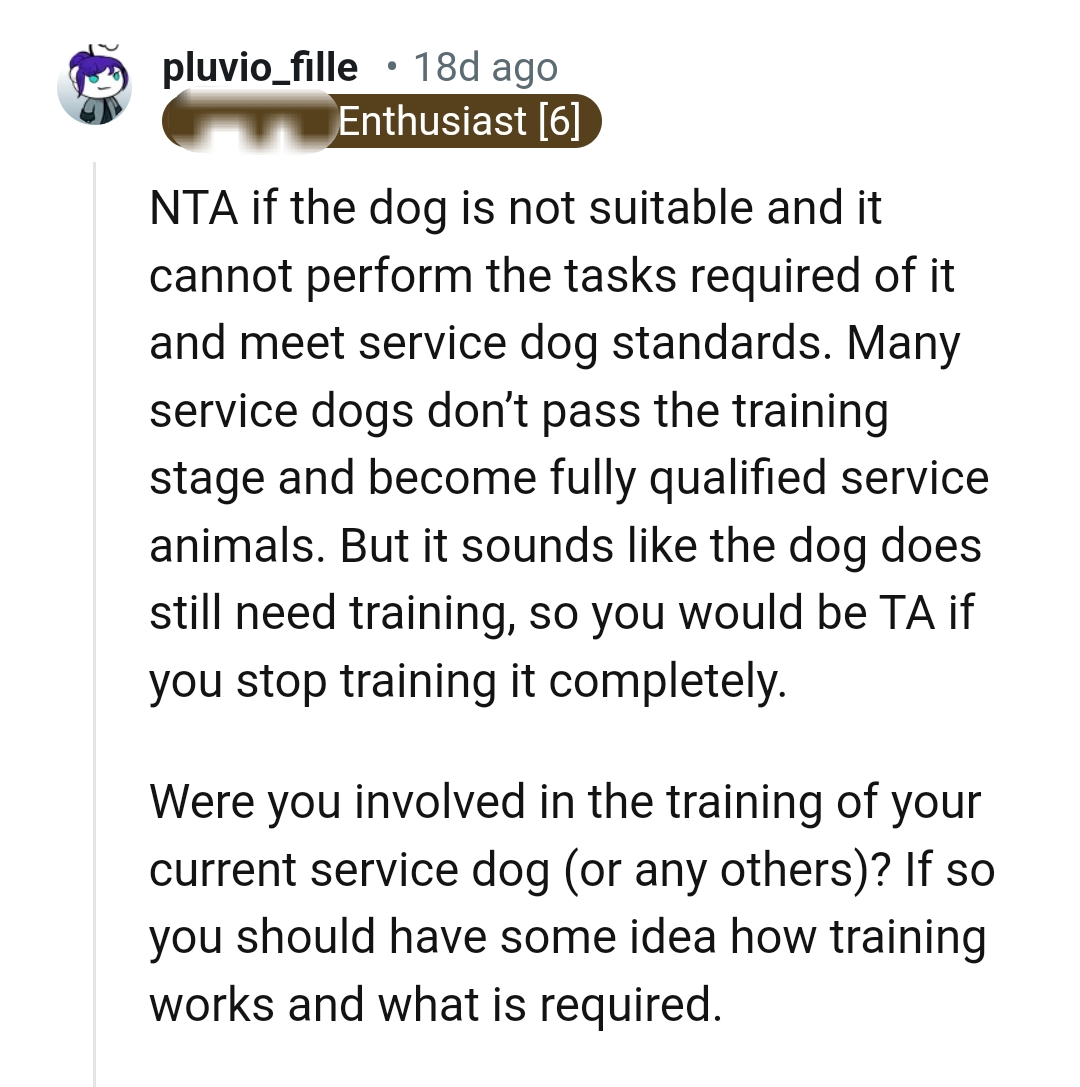
Research by Dr. Shawn Achor, a leading positive psychology researcher, emphasizes that the human-animal bond can profoundly influence mental health. He states, "When individuals feel their service dog is not fulfilling their needs, it can heighten feelings of loneliness and isolation, particularly among those with disabilities." Understanding this emotional landscape is vital for caregivers and trainers to offer the necessary support and resources for both the handler and the animal.
She might be someone else's service dog
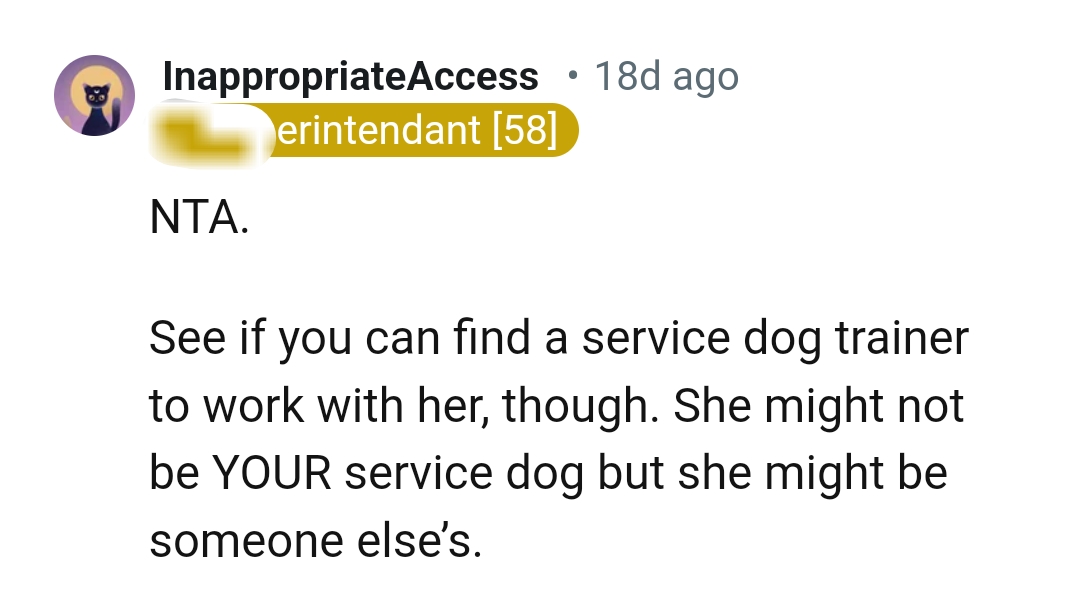
Psychological Analysis
The concerns expressed about the service dog reflect a deeper struggle with the expectations placed on both the owner and the animal. It's common for individuals to feel overwhelmed when they perceive that their needs are not being met, leading to feelings of inadequacy.
Addressing these feelings through open support and professional guidance can create a pathway toward healthier management of these relationships.
Analysis generated by AI
Analysis & Alternative Approaches
In summary, the relationship between a service dog and its owner is complex and can be influenced by various factors, including training and emotional expectations. Research suggests that fostering a strong bond through proper training and support can enhance the effectiveness of service animals in their roles.
By acknowledging the emotional needs of both the owner and the dog, individuals can work toward creating a more fulfilling partnership.
Psychological Analysis
This situation reflects the immense pressures that can accompany the responsibility of a service dog. It's crucial for individuals to recognize their limits and seek appropriate support when feeling overwhelmed, as this can lead to better outcomes for both themselves and their service animals.
Analysis generated by AI
Analysis & Alternative Approaches
Ultimately, the decision to acquire or abandon a service dog is a complex one that requires careful consideration of emotional, practical, and ethical factors. As research indicates, fostering a supportive environment and utilizing effective coping strategies can help individuals navigate the challenges associated with service dog ownership. With the right support and resources, many handlers can achieve a fulfilling partnership with their service dogs.
The OP left more details in the comments section and here it is...
I trained my first dog by myself and have trained other dogs since. I have autism; my disability is not something that can be helped by technology. While my current dog does know and can perform tasks, his main purpose is simply just being there when the world gets to be too much.
Coping Strategies for Service Dog Handlers
For those struggling with the responsibilities of caring for a service dog, developing coping strategies can be crucial. Research from the University of Pennsylvania suggests that mindfulness practices can significantly enhance emotional regulation, helping individuals manage stress more effectively. Simple techniques, such as deep breathing exercises or progressive muscle relaxation, can be implemented to alleviate anxiety and promote a sense of calm.
Additionally, joining support networks and communities for service dog handlers can provide invaluable social support and share experiences that normalize the challenges faced. This collective understanding can help individuals feel less alone in their journey.
The Role of Training in Service Animals
Training is an essential aspect of service dog ownership that can impact the relationship between the owner and the dog. According to the Journal of Applied Animal Welfare Science, insufficient training can lead to behavioral issues that may increase the owner's stress and anxiety levels, as they may feel unprepared to handle the animal's needs.
Moreover, it's important to recognize that the process of training a service dog can also be emotionally taxing. Owners may feel a sense of guilt or shame if they believe they are not meeting the expectations set during training.
The OP says that she took the dog to a trainer for a two-week session, and the woman there said that the pup doesn't have what she would usually like to see in a service dog. They also added that if she worked hard enough, she could be able to do it.
Redditors understood the OP, but she was declared not the AH.
To address these challenges, it's crucial for individuals to seek professional guidance during the training process. Working with certified trainers who specialize in service dog training can help align expectations and ensure that the dog is adequately prepared for the tasks required of them.
Additionally, support groups for service dog owners can provide a platform for sharing experiences, strategies, and emotional support, which can alleviate feelings of isolation and frustration.
Moreover, effective training is critical for both the dog and the handler. Studies indicate that engaging in positive reinforcement techniques during training sessions can enhance the bond between the handler and dog, leading to better outcomes for both parties. It's essential for handlers to seek out reputable training programs that emphasize humane and effective training methods.
Handlers may also benefit from working with a certified professional dog trainer who specializes in service animals to ensure they are adequately prepared to meet the dog's needs and maximize the benefits of the service they provide.



